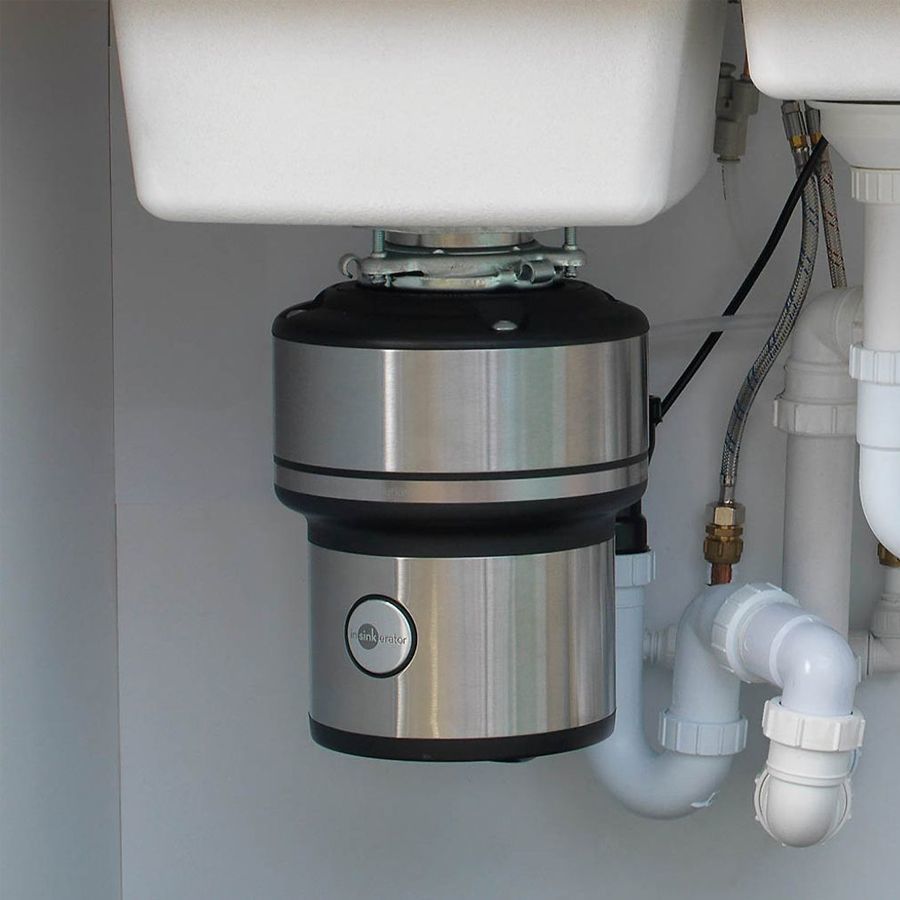Waste Disposal Unit Installation Auckland
One of the most common and useful kitchen appliances is the waste disposal unit. It’s also known as a food disposal unit, waste disposer, or InSinkErator®. Installing waste disposal units are part of our regular work at Sumich Plumbing & Drainage. Often, when we’re called out to look at an issue with a kitchen sink, it’s really a problem with the waste disposer that we’re addressing.

What’s included in our service?
Our team has over 30 years of experience in kitchen plumbing, supplying & installing waste disposal units.
Our service includes:
- Supplying the most appropriate waste disposal unit, such as the InSinkErator®.
- Providing guidance & tips on how to propertly maintain and use your waste disposal unit.
Over the years we have worked on numerous new kitchen installations and kitchen renovations, and have installed a variety of makes and models of food disposal units.
There are a few trusted brands available, but we’re big fans of InSinkErator®. They have been around for years, have a good range of sizes and models, and are easy to use and maintain.
Waste Disposal Unit Installation
Call now: 0508 786 424
Don’t forget to mention Free Quote!*
How to use a waste disposal unit properly?
You shouldn’t just put anything and everything down the sink. There is a lot that goes down the sink that instead should be put in the rubbish bin, recycling, and even the compost bin.
To put it simply, if something is biodegradable or dissolvable in water, then it’s probably safe to put down the waste disposal unit. This includes most types of food waste. Like anything, though, there are a few exceptions.
What should you avoid putting down the sink?
- food wrappers, plastic, aluminium foil, wax/baking paper
- serviettes, paper towels (while they are paper-based, many of them are treated with other substances or are too thick to be put in the waste water system)
- cigarettes or cigarette butts
- fruit stickers, tea bag strings
We also recommend taking care when putting the following down the waste disposal unit:
- egg shells, bones
- too much fibrous vegetable waste (celery, silverbeet, cabbage, etc)
Many newer models of waste disposal units will claim that it is okay to use them to dispose of chicken bones, egg shells, some types of seafood shells, stone fruit pips, and other hard food scraps. We issue a word of caution here. If your waste disposer is an older model (e.g. it was installed more than a few years ago), then it’s probably safer if you don’t put hard or “crunchy” food scraps down the sink.
The other thing we suggest you do is look under the kitchen sink and see if you can find the make and model details of your waste disposal unit. If you can, then search online to see what the product use guidelines from the manufacturer stipulate. It also pays to check if the unit is still under warranty. If you can’t find any information on it, or it’s older than a few years, we suggest you err on the side of caution when using it.
If you’re not sure how old your waste disposal unit is, whether it’s still under warranty, or what you’re safe to put down it, get in touch with us. We can talk through a few possibilities with you. Maintaining, a
And installing waste disposal units and InSinkErator® units is an area of expertise for us at Sumich Plumbing & Drainage.
Installing waste disposal units
Retail prices for the InSinkErator® brand of food waste disposers range from approximately $350 to $900, depending on the size and model. Sumich Plumbing, however, may be able to secure a trade price for you, depending on the model you’re interested in.
The Sumich Plumbing & Drainage team specialises in supplying and installing waste disposal units.
Get in touch for a no-obligation quote.
Frequently Asked Questions
If you’re having issues with your unit or suspect that it’s not working as best as it could be, we can have a look at it and see whether we can get any more life out of it. We’ll do what we can to help you prolong the life of your existing food disposal unit – as long as it’s working effectively and safely.
We will determine whether there are any blockages in the unit or the associated plumbing work. We can check if any of the parts are starting to fail – the motor, grinding teeth, grinding ring.





